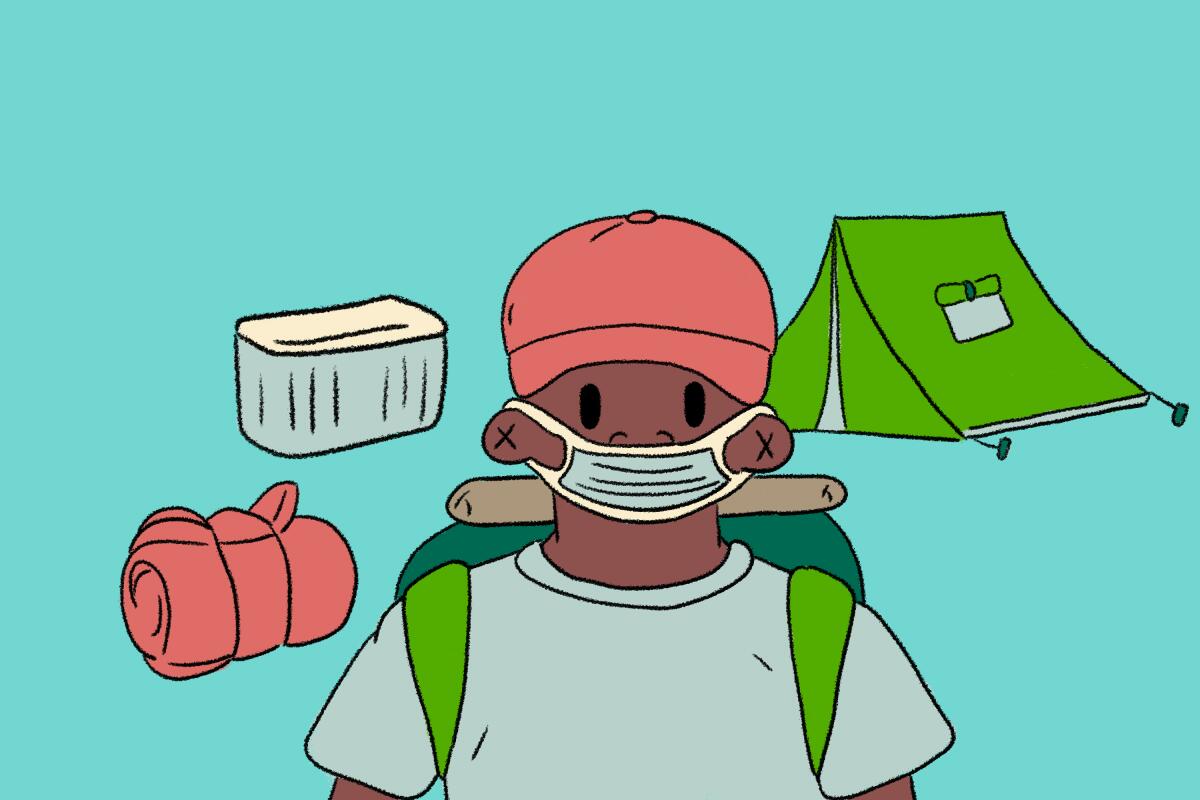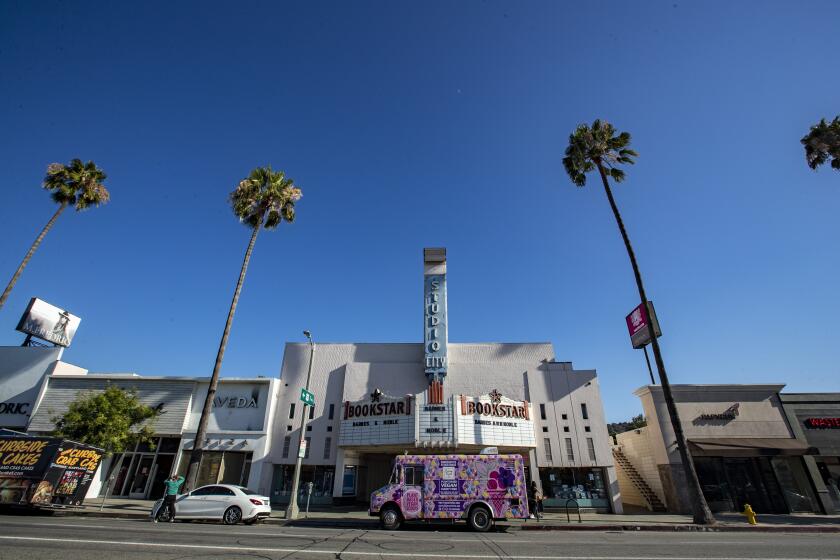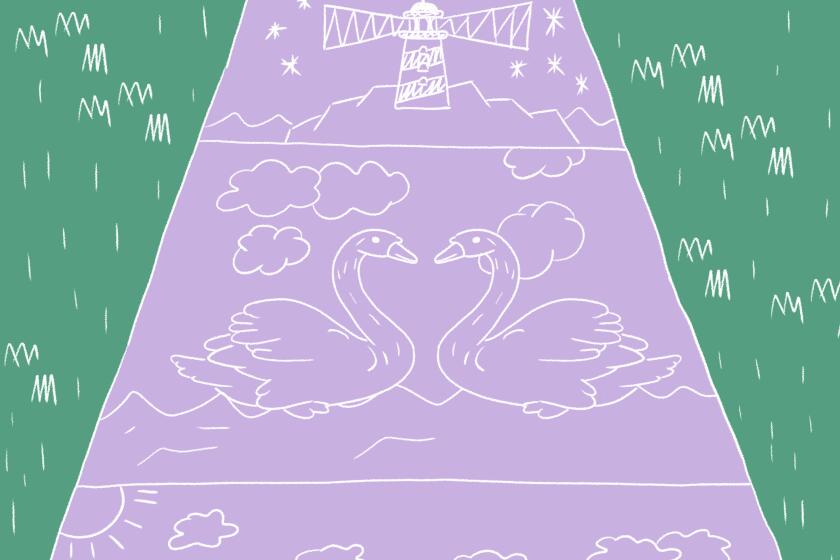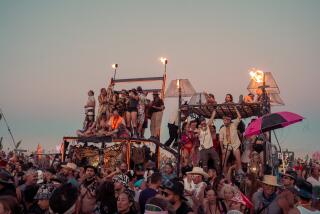Want more diversity in camping? Start with the gear

- Share via
In May, Mo Jackson was camping with a friend in Coeur d’Alene, Idaho. They woke at 5 to start a fire, make breakfast and — in the midst of a pandemic — experience the peace that comes with an early morning in a secluded spot.
The beauty of that morning moved Jackson to tears. “I had the most clarifying moment. You know, I just thought, I wish everyone could feel this.”
Jackson realized that, although they could not help everyone feel more connected to nature, they could get a few more people outside by offering free camping gear. “That day I was like, OK, what can I do to get more Black people outdoors? And I thought, well, I have enough savings to get three camping kits together.”
On May 19, Jackson posted on Instagram asking if any people of color wanted a free camping kit. “No need to demonstrate need or anything,” Jackson wrote. “Just ask and we can get something out to you.”
The kit would include two sleeping bags, a tent and a cooler. Jackson included a Venmo account on Instagram so people could donate to the cause.
The post brought in close to $500, which, combined with Jackson’s savings, paid for five camping kits for people who needed gear to get out in nature.
Get The Wild newsletter.
The essential weekly guide to enjoying the outdoors in Southern California. Insider tips on the best of our beaches, trails, parks, deserts, forests and mountains.
You may occasionally receive promotional content from the Los Angeles Times.
Jackson initially purchased the ready-to-go kits from REI, which cost about $300 each. The kits included quality tents and bags from companies such as Kelty and Wilderness Technology.
Segregation on public lands
Camping is often called America’s favorite outdoor activity. This summer, when many travel options have been eliminated, the go-to vacation has been camping or renting an RV and visiting public lands.
But camping and national parks have a complicated past when it comes to racial equality and equal access for all. National parks have a history of segregation that dates to the 1930s, something that didn’t change until the passage of the 1964 Civil Rights Act.
Almost all U.S. national parks were originally home to Indigenous populations long before they were set aside as parks. Many of those Native American tribes were pushed off their land, often violently, to create an illusion of untouched landscapes.
Even the Sierra Club, for the first time, in July openly condemned its founder, John Muir, over racist comments in his writings about Black and Indigenous people. The years of segregation, racism and displacement continue to define national parks and other public lands as predominantly white spaces.
A 2018 study by the Society of American Foresters found that between 2010 and 2014, 94.6% of visitors to national forests identified as white. People who identified as Latino made up 5.7%, and those who identified as Black made up 1.2%.
Jackson’s personal experiences bear out those numbers. They grew up camping and hiking but noticed at an early age that not many other families resembled theirs. “My dad and I would almost always be the only Black people at any camp we went to,” Jackson said.
After sending out the first few BIPOC Camping Kits and getting positive responses from people who had received them, Jackson decided to put out another call on Instagram. By then it was July and much had changed.
Protests had swept the nation in the wake of the deaths of George Floyd, Ahmaud Arbery and Breonna Taylor. Thousands of Americans took to the streets, outraged by the continued disregard for the lives of Black people.
Donations take off
This time the response was much bigger. “People just cared more all of a sudden,” Jackson said. More than 600 people reached out and asked for camping kits. Jackson needed more funding and took the campaign to GoFundme, where, as of Aug. 5, more than $55,000 had been raised.
“I think there is a lot of white guilt right now,” Jackson said, explaining why donations suddenly took off. “We’re all learning and growing; sometimes guilt is part of it too — not that we want guilt and shame, but we do want growth.”
Given the rapid rise of interest in BIPOC Camping Kits, Jackson tapped friends Griffin Ripley, B Sánchez and Hayley Harris to help.
“There are so many Black people in the Pacific Northwest, even though people pretend like we’re not here,” said Harris, who works for a nonprofit. Harris has been helping set up BIPOC Camping Kits as a nonprofit.
Harris didn’t go camping until she was 18. “I went with one of my white friends and her mom — camping wasn’t accessible to me — and I thought it was awesome. But every time I wanted to go camping after that, I had to wait until one of my white friends wanted to go,” Harris said.
The disparity in access to the outdoors is particularly frustrating to Harris, who pointed out that those who could most benefit from being in a rural environment have often felt excluded. “Being in nature is healing,” she said. “People who need that healing most are Black and Indigenous people, and the idea that it’s inaccessible … it’s just not right.”
Harris was excited about Jackson’s initiative because she couldn’t afford to buy her own gear. “Tents are hundreds of dollars, sleeping bags are super expensive, and if you’re really going camping, you can’t scrimp on gear. You could end up freezing at night,” she said.
These walking routes will help you explore the city and keep you fit.
A smaller outdoors store, Next Adventure, based in Portland, Ore., noticed the initiative on Instagram. “Our followers started to tag us in Mo’s posts,” said Devin Kelly, Next Adventures’ community relations manager. “I contacted Mo and we realized we could help.”
It is an ideal partnership. “We have always believed in helping support our community in getting outdoors,” said Bryan Knudsen, co-owner of Next Adventure.
“Mo and their team wanted to step up; we are just thrilled to support them and help more people get outside,” said Deek Heykamp, another co-owner. The kits assembled with Next Adventure cost $200 to $250.
On Aug. 1, Jackson and the BIPOC Camping Kits team, along with people at Next Adventure, assembled more than 200 kits at the company’s warehouse. Some were customized for people with specific needs or physical disabilities. The kits were shipped across the country Aug. 3.
Jackson had to close the requests for kits once the number reached 600. They will ship the remaining 400 orders in partnership with Next Adventure soon. Jackson will reopen requests for kits once more money has been raised.
One of the first people to reach out to Jackson for a kit was Ale Abreu, who lives in Olympia, Wash. Despite living close to some of the most beautiful outdoors sites in the country, Abreu found camping inaccessible. “I’m working class,” said Abreu. “I was intimidated. Did I have what I needed? Would I be warm and comfortable? Camping is an investment, and I’ve always had to prioritize other bills.”
How to get on-demand gear for your next camping trip, and the best routes to get your 10,000 steps.
Abreu received a BIPOC Camping Kit in June. “I’m really impressed. It’s clearly high quality and something I will be able to use again and again.”
After Abreu received the gear, Jackson offered to get on FaceTime and demonstrate how to set up the tent. “Mo wanted to make sure there was no barrier to me enjoying the equipment, which was another added layer of care,” Abreu said.
Abreu used the camping kit to visit the Mt. Rainier area with a friend and is planning a trip to the Columbia River Gorge. “I came away from the trip to Mt. Rainier with more confidence in myself — feeling more connected to nature,” Abreu said.
“It’s a precious gift, especially for someone like myself and, I think, for a lot of people of color,” Abreu said, “because of systemic oppression, because of racism, economics and all these things we have to navigate — it can all result in a de-centering.” Camping, Abreu said, allows re-centering in the midst of social and political chaos. “It’s a moment to catch your breath.”
Jackson intends to expand the BIPOC Camping Kits venture. “Black and Indigenous people have historically had connections to nature and the land that have been stripped from us,” they said. “My bigger picture is full solidarity; it’s going to take all of us coming together to topple these racist systems so we can find our sacred places again, and find peace again, together.”
More to Read
Sign up for The Wild
We’ll help you find the best places to hike, bike and run, as well as the perfect silent spots for meditation and yoga.
You may occasionally receive promotional content from the Los Angeles Times.













